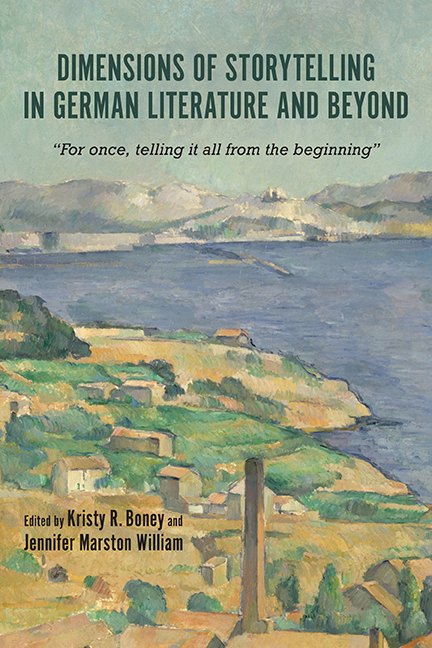 Dimensions of Storytelling in German Literature and Beyond
Dimensions of Storytelling in German Literature and Beyond Book contents
- Frontmatter
- Contents
- Acknowledgments
- Introduction: The Social, Political, and Personal Dimensions of Storytelling
- Part I Anna Seghers: A Missing Piece in the Canon of Modernist Storytellers
- Part II Expressions of Modernity: Using Storytelling Unconventionally
- 8 Storytelling and Telling Stories in Heine's Prose Fiction
- 9 Modernist Haze: Topographical Textures in Paul Klee and Franz Kafka
- 10 Synthesis and Transtextuality: The Jewish Reinvention of Chinese Mythical Stories in “Shanghai Ghetto”
- 11 American Children Writing Yiddish: The Published Anthologies of the Chicago Sholem Aleichem Schools
- 12 A Literary Depiction of the Homeland of Jews in Czechoslovakia and East Germany after 1945
- 13 Changed for the Better? Alternative Uses of the Transformative Cancer Trope in Thomas Mann's Die Betrogene and Nadine Gordimer's Get a Life
- Part III The Personal Narrative: Storytelling in Acute Historical Moments
- Notes on the Contributors
- Index
12 - A Literary Depiction of the Homeland of Jews in Czechoslovakia and East Germany after 1945
from Part II - Expressions of Modernity: Using Storytelling Unconventionally
Published online by Cambridge University Press: 12 April 2019
- Frontmatter
- Contents
- Acknowledgments
- Introduction: The Social, Political, and Personal Dimensions of Storytelling
- Part I Anna Seghers: A Missing Piece in the Canon of Modernist Storytellers
- Part II Expressions of Modernity: Using Storytelling Unconventionally
- 8 Storytelling and Telling Stories in Heine's Prose Fiction
- 9 Modernist Haze: Topographical Textures in Paul Klee and Franz Kafka
- 10 Synthesis and Transtextuality: The Jewish Reinvention of Chinese Mythical Stories in “Shanghai Ghetto”
- 11 American Children Writing Yiddish: The Published Anthologies of the Chicago Sholem Aleichem Schools
- 12 A Literary Depiction of the Homeland of Jews in Czechoslovakia and East Germany after 1945
- 13 Changed for the Better? Alternative Uses of the Transformative Cancer Trope in Thomas Mann's Die Betrogene and Nadine Gordimer's Get a Life
- Part III The Personal Narrative: Storytelling in Acute Historical Moments
- Notes on the Contributors
- Index
Summary
ACCORDING TO THE PREVAILING HISTORICAL NARRATIVE, around 40,000 to 56,000 Czechoslovak Jews returned from concentration camps and exile to their former homeland in order to start a new life after the Second World War. At the same time, some 3,500 Holocaust survivors came to the Soviet occupation zone in Germany hoping to find a new home there. This statistic corresponds to 3 percent of the Jewish population that had lived in that territory before the war. These figures directly convey the disaster of the Shoah on a factual scale, one that most historians corroborate.
However, such a narrative is just one way of looking at the past. This point of view lacks the phenomenological dimension of the atrocity and does not depict the distressed human condition of the returning Jews and the post-traumatic anxiety they had from being in concentration camps. These experiences, whether in an individual or collective form, are the core of literary narratives dealing with these past events and memories of these events. Paul Ricoeur states that literary narrative offers a view into the human condition, since it conveys human life in its complexity and different modalities. Literary narrative opens a new horizon for understanding the world that surrounds us in the context of the past, present, and future.
Drawing from Ricoeur's perception of narrative, in the following text I pursue the literary narratives about Holocaust survivors returning from concentration camps or exile immediately after the Second World War. The study concentrates on the Czech literary text, All the Colors of the Sun and the Night (Alle Farben der Sonne und der Nacht) by Lenka Reinerová and the (East) German novel, Der Boxer by Jurek Becker. Both works consist of stories of Jewish survivors in Czechoslovakia and East Germany (the GDR). My analysis explores the differences and similarities between Czech and German literary narratives about Jewish survivors. It encompasses how Czechs and Germans perceived them, the survivors’ struggle with anti- Semitism in the pertinent societies, and their quest for self-identity and a homeland.
Despite the small number of returning Jews, they played an important role in the cultural and political life in both countries. In Czechoslovakia, both Czech-speaking and German-speaking Jews, such as Egon Erwin Kisch, Luis Fürnberg, and Lenka Reinerová, were active in cultural life until they were struck by a new anti-Semitic wave that took the form of political trials during the 1950s.
- Type
- Chapter
- Information
- Dimensions of Storytelling in German Literature and Beyond“For once, telling it all from the beginning”, pp. 164 - 175Publisher: Boydell & BrewerPrint publication year: 2018


